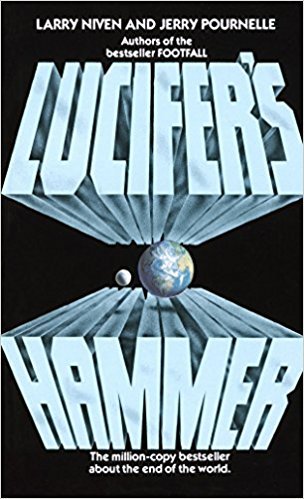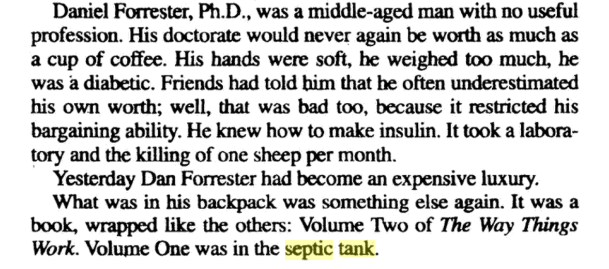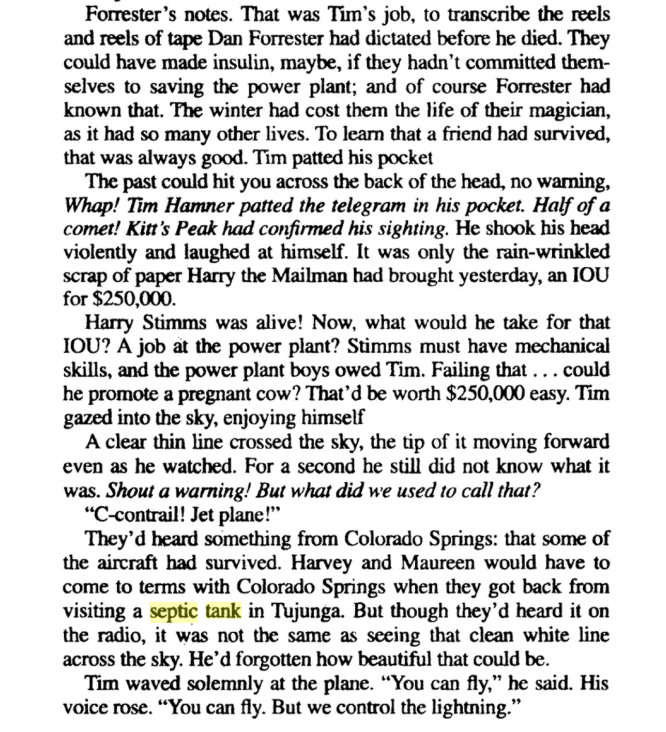The days of fear of nuclear war have receded into a simmer that bubbles up occasionally when North Korea engages in sabre rattling but the fear is still nowhere near the level of the Cold War era.
The Cold War era also was very prolific in the post-apocalyptic fiction genre when authors found plenty of propaganda and scenarios to imagine the worst outcomes of life on earth and weave adventurous stories of survival and triumph.
Many of these books, especially the ones on the topic of nuclear war, featured heroes and heroines succeeding in hard times: resourceful, independent, becoming leaders, anti-communist and even overtly patriotic. Reading some of these today – Alas, Babylon, On the Beach, Farnham’s Freehold, etc. – the stories seem a little dated but still enjoyable.
There are many sub-categories of the post-apocalyptic genre. Some approach a nearer relevance today such as cosmic catastrophe, environmental disaster, dystopia and pandemic to name a few.
The book I want to talk about today is called Lucifer’s Hammer (1978) by Larry Niven and Jerry Pournelle. Lucifer’s Hammer was different than the other post-apocalyptic books I had read in the 80s as it was based off a natural, cosmic disaster – that of the earth being struck by a comet named Hammer-Brown from amateur astronomer Tim Hammer who discovered it.

Image Source Amazon.com stock photo
Up to this point in my life in the 80s I had been exposed to a sampling of dystopian fiction from literature class: Ayn Rand and George Orwell, which were required reading in Cold War era American high schools. Their anti-socialist theme fit well within the curriculum. There were ads like this on TV:
Ronald Reagan - "Prepared for Peace" (Political Ad, 1984) - YouTube
"Prepare for peace" actually means to develop and stockpile more nuclear weapons.
Whereas dystopian novels tended to emphasize a bleak far future under an oppressive National State, Lucifer’s Hammer was very localized with most of the action taking place in a near future California where survivors grouped together and attempted to maintain a democratic way of governance.
Hero Nerd
Tim is the main protagonist in the book but he’s not the most interesting character in my opinion. I think the book is a bit mediocre compared to others of Niven & Pournelle’s as it’s a bit long and I just never really grow to like Tim Hammer or be concerned for his plight. Yet, Lucifer’s Hammer remains a staple in most every post-apocalyptic genre lover’s bookshelf, myself included.
The most interesting character in Lucifer’s Hammer is Dan Forrester. Dan Forester was a PhD, nerd, overweight and diabetic. In most post-apocalyptic fiction scenarios Dan would have been the equivalent of a Trek “Red Shirt.1”
When the Hammer-Brown hits Earth, Dan finds himself making the decision to leave his house. He laments leaving his books behind containing a wealth of knowledge. Dan decides to bury the books in an empty septic tank behind his newly built house.
Dan then takes off with a backpack of supplies and a few books and sets out to find others who he can join up with. His main concern is to find an insulin source and as Lucifer's Hammer progresses this is always a major threat to Dan’s life even when he finally does find others to live with. Ultimately Dan forfeits his life when he chooses to help bring a power plant online instead of spending time making insulin.
Several times in the book the main characters make journeys from their foothold back to Dan’s house in Tujunga to retrieve books from the septic tank. It’s an arduous and extremely dangerous journey but well worth it as Dan’s books contain "How To" knowledge like the indispensable The Way Things Work.

Source Google Books
I loved Dan because he was a nerd before nerds were cool. His struggles were very imminent and real. How was an insulin injecting diabetic going to survive with no resources? As a teenage nerdy girl I identified with Dan because let’s face it whether we want to believe it or not, teens are still dependent on adults. We’re vulnerable. Everyone depends on someone unless you’re the Feral Kid2, which I surely wasn’t.
But part of the appeal of these kinds of books is that they are educational about survival and becoming self-reliant hence probably why I developed a keen interest in the genre.
“We Control the Lightning”

Source Google Books
It’s possible to access a septic tank in this apocalyptic scenario. Maybe very difficult, unwise, or with low odds of success, but it’s possible. But you would have an even more difficult time accessing digital media, unless you had a power source.
Finding a power source may be or not difficult if you can find a battery or generator. Even so your time would be limited depending on the availability of the power.
In our modern day we have a wide variety of ways to extract and find power i.e. solar, battery, wind, etc. The likelihood of a worldwide power outage for a sustained period of time seems slim, but that’s just my opinion.
I don’t mean to imply a book is a superior record. After all paper is fragile it certainly is not indestructible. My thoughts revolve concerns around access of knowledge.
Blockchain is a means of recording data which is permanent and non-modifiable. While I doubt a worldwide power outage is imminent what happens if parts of the population go dark? Of course, currency would probably be low on the list of priorities but tomes like The Way Things Work would be highly useful.
I think about all the pictures I have up “in the cloud” and how I would be like Maggie Foster the TV show “Revolution”3 where she clings to a long dead iPhone that contains the photos of her lost children.
On the flipside when a disaster is localized people are very grateful their images are stored digitally on cloud storage and then things like loss of photos become less painful. It’s a matter of the kind of disaster and how far reaching.
With the current cryptocurrency prices falling I’m probably in the minority in that I’m in it mostly for the philosophical reasons although I do HODL a little. The potential for the technology is what I’m interested in as a means of storage and preservation.
There are other fictional stories that explore this motif of “books being valuable during apocalyptic events” and Lucifer’s Hammer certainly isn’t the only one.
The movie “The Day After Tomorrow” has an epic scene in a New York library where a Guttenberg Bible is withheld from being burned because it is just too precious:
Elsa: What have you got there?
Jeremy: A Gutenberg Bible. It was in the rare books room.
Elsa: You think God's gonna save you?
Jeremy: No, I don't believe in God.
Elsa: You're holding onto that Bible pretty tight.
Jeremy: I'm protecting it. [glares at Sam] This Bible is the first book ever printed. It represents the dawn of the Age of Reason. As far as I'm concerned, the written word is mankind's greatest achievement. You can laugh. But if Western civilization is finished, I'm gonna save at least one little piece of it.
source: https://en.wikiquote.org/wiki/The_Day_After_Tomorrow
Do you have any favorite books or movies in the post-apocalyptic genre where preserving knowledge is a motif? Please comment and let me know I welcome recommendations.
⬧❖⬧
Thank you so much for reading!
Find me on Twitter if you want to stay in touch https://twitter.com/antimetica
1 - Star Trek Red Shirt http://memory-alpha.wikia.com/wiki/Redshirt
2 - Feral Kid, from the movie Mad Max 2 http://madmax.wikia.com/wiki/Feral_Kid
3 - "Revolution" show https://www.ranker.com/review/revolution/73337363?ref=node_name&pos=4&a=0<ype=n&l=681978&g=2
We have definitely seen a few movies with this in there, I will have to call on @johngreenfield 's wonderful memory for titles.
I was thinking about the loss of access to knowledge most people would encounter just the other day. We were watching a youtube video about really silly wikihow's - for things that you should have a degree to be doing, like surgery. I immediately thought the most useful time for this would be this sort of post-apocalyptic scenario, but like you say, it would be hard to get to. I am all for the preservation of the printed form, but the availability of information on the internet allows people to expose themselves to vast amounts of knowledge really easily, so maybe we would find there were groups of people who had been able to retain this information for survival purposes. If you don't mind, I may let this inspire a theme for a contest round? Although I do have quite a list to get through.
Yes if you two can think of any titles that's cool!
Haha "things you should have a degree to be doing" that's one of those cases where truth is stranger than fiction right?
Feel free to be inspired, I'm happy that you liked it enough it stuck in your brain! <3
Peace, Abundance, and Liberty Network (PALnet) Discord Channel. It's a completely public and open space to all members of the Steemit community who voluntarily choose to be there.Congratulations! This post has been upvoted from the communal account, @minnowsupport, by Antimetica from the Minnow Support Project. It's a witness project run by aggroed, ausbitbank, teamsteem, theprophet0, someguy123, neoxian, followbtcnews, and netuoso. The goal is to help Steemit grow by supporting Minnows. Please find us at the
If you would like to delegate to the Minnow Support Project you can do so by clicking on the following links: 50SP, 100SP, 250SP, 500SP, 1000SP, 5000SP.
Be sure to leave at least 50SP undelegated on your account.